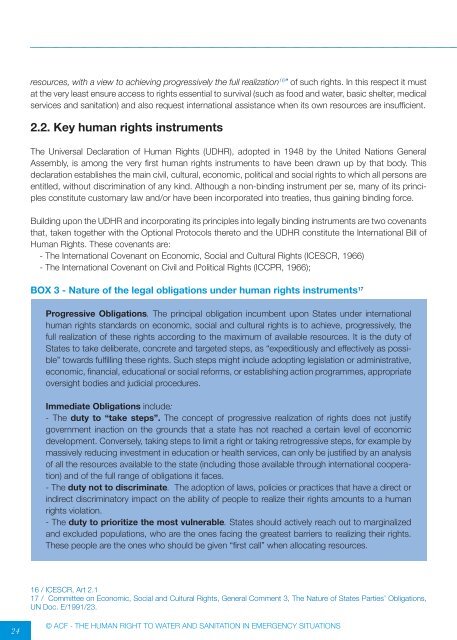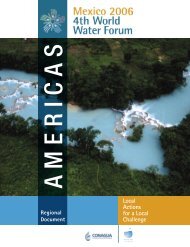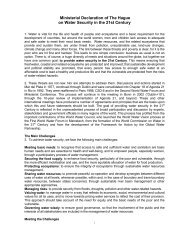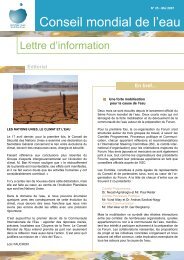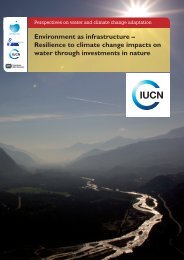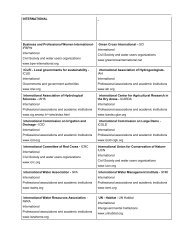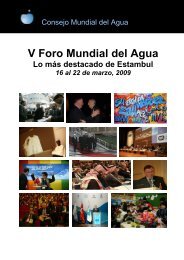the human right to water and sanitation in emergency situations
the human right to water and sanitation in emergency situations
the human right to water and sanitation in emergency situations
Create successful ePaper yourself
Turn your PDF publications into a flip-book with our unique Google optimized e-Paper software.
24<br />
resources, with a view <strong>to</strong> achiev<strong>in</strong>g progressively <strong>the</strong> full realization 16 ” of such <strong>right</strong>s. In this respect it must<br />
at <strong>the</strong> very least ensure access <strong>to</strong> <strong>right</strong>s essential <strong>to</strong> survival (such as food <strong>and</strong> <strong>water</strong>, basic shelter, medical<br />
services <strong>and</strong> <strong>sanitation</strong>) <strong>and</strong> also request <strong>in</strong>ternational assistance when its own resources are <strong>in</strong>sufficient.<br />
2.2. Key <strong>human</strong> <strong>right</strong>s <strong>in</strong>struments<br />
The Universal Declaration of Human Rights (UDHR), adopted <strong>in</strong> 1948 by <strong>the</strong> United Nations General<br />
Assembly, is among <strong>the</strong> very first <strong>human</strong> <strong>right</strong>s <strong>in</strong>struments <strong>to</strong> have been drawn up by that body. This<br />
declaration establishes <strong>the</strong> ma<strong>in</strong> civil, cultural, economic, political <strong>and</strong> social <strong>right</strong>s <strong>to</strong> which all persons are<br />
entitled, without discrim<strong>in</strong>ation of any k<strong>in</strong>d. Although a non-b<strong>in</strong>d<strong>in</strong>g <strong>in</strong>strument per se, many of its pr<strong>in</strong>ciples<br />
constitute cus<strong>to</strong>mary law <strong>and</strong>/or have been <strong>in</strong>corporated <strong>in</strong><strong>to</strong> treaties, thus ga<strong>in</strong><strong>in</strong>g b<strong>in</strong>d<strong>in</strong>g force.<br />
Build<strong>in</strong>g upon <strong>the</strong> UDHR <strong>and</strong> <strong>in</strong>corporat<strong>in</strong>g its pr<strong>in</strong>ciples <strong>in</strong><strong>to</strong> legally b<strong>in</strong>d<strong>in</strong>g <strong>in</strong>struments are two covenants<br />
that, taken <strong>to</strong>ge<strong>the</strong>r with <strong>the</strong> Optional Pro<strong>to</strong>cols <strong>the</strong>re<strong>to</strong> <strong>and</strong> <strong>the</strong> UDHR constitute <strong>the</strong> International Bill of<br />
Human Rights. These covenants are:<br />
- The International Covenant on Economic, Social <strong>and</strong> Cultural Rights (ICESCR, 1966)<br />
- The International Covenant on Civil <strong>and</strong> Political Rights (ICCPR, 1966);<br />
BoX 3 - nature of <strong>the</strong> legal obligations under <strong>human</strong> <strong>right</strong>s <strong>in</strong>struments 17<br />
Progressive obligations. The pr<strong>in</strong>cipal obligation <strong>in</strong>cumbent upon States under <strong>in</strong>ternational<br />
<strong>human</strong> <strong>right</strong>s st<strong>and</strong>ards on economic, social <strong>and</strong> cultural <strong>right</strong>s is <strong>to</strong> achieve, progressively, <strong>the</strong><br />
full realization of <strong>the</strong>se <strong>right</strong>s accord<strong>in</strong>g <strong>to</strong> <strong>the</strong> maximum of available resources. It is <strong>the</strong> duty of<br />
States <strong>to</strong> take deliberate, concrete <strong>and</strong> targeted steps, as “expeditiously <strong>and</strong> effectively as possible”<br />
<strong>to</strong>wards fulfill<strong>in</strong>g <strong>the</strong>se <strong>right</strong>s. Such steps might <strong>in</strong>clude adopt<strong>in</strong>g legislation or adm<strong>in</strong>istrative,<br />
economic, f<strong>in</strong>ancial, educational or social reforms, or establish<strong>in</strong>g action programmes, appropriate<br />
oversight bodies <strong>and</strong> judicial procedures.<br />
Immediate obligations <strong>in</strong>clude:<br />
- The duty <strong>to</strong> “take steps”. The concept of progressive realization of <strong>right</strong>s does not justify<br />
government <strong>in</strong>action on <strong>the</strong> grounds that a state has not reached a certa<strong>in</strong> level of economic<br />
development. Conversely, tak<strong>in</strong>g steps <strong>to</strong> limit a <strong>right</strong> or tak<strong>in</strong>g retrogressive steps, for example by<br />
massively reduc<strong>in</strong>g <strong>in</strong>vestment <strong>in</strong> education or health services, can only be justified by an analysis<br />
of all <strong>the</strong> resources available <strong>to</strong> <strong>the</strong> state (<strong>in</strong>clud<strong>in</strong>g those available through <strong>in</strong>ternational cooperation)<br />
<strong>and</strong> of <strong>the</strong> full range of obligations it faces.<br />
- The duty not <strong>to</strong> discrim<strong>in</strong>ate. The adoption of laws, policies or practices that have a direct or<br />
<strong>in</strong>direct discrim<strong>in</strong>a<strong>to</strong>ry impact on <strong>the</strong> ability of people <strong>to</strong> realize <strong>the</strong>ir <strong>right</strong>s amounts <strong>to</strong> a <strong>human</strong><br />
<strong>right</strong>s violation.<br />
- The duty <strong>to</strong> prioritize <strong>the</strong> most vulnerable. States should actively reach out <strong>to</strong> marg<strong>in</strong>alized<br />
<strong>and</strong> excluded populations, who are <strong>the</strong> ones fac<strong>in</strong>g <strong>the</strong> greatest barriers <strong>to</strong> realiz<strong>in</strong>g <strong>the</strong>ir <strong>right</strong>s.<br />
These people are <strong>the</strong> ones who should be given “first call” when allocat<strong>in</strong>g resources.<br />
16 / ICESCR, Art 2.1<br />
17 / Committee on Economic, Social <strong>and</strong> Cultural Rights, General Comment 3, The Nature of States Parties’ Obligations,<br />
UN Doc. E/1991/23.<br />
© ACF - THE HUMAN RIGHT TO WATER AND SANITATION IN EMERGENCY SITUATIONS


